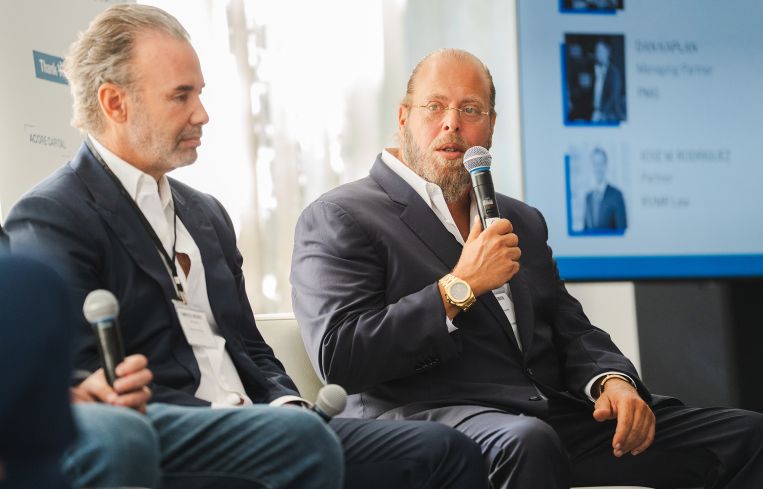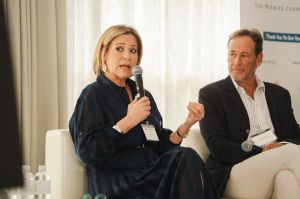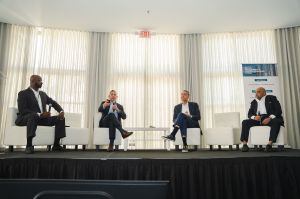South Florida Boom Evolves Amid ‘Growing Pains,’ With $630M Loan on Deck
Dezer teases a $630 million financing, but investors at Commercial Observer’s Development & Capital Forum say the post-pandemic residential bonanza has cooled
By Jeff Ostrowski October 9, 2025 5:15 pm
reprints
After a pandemic-era surge of money and people, South Florida’s real estate market is taking a bit of a breather, according to real estate executives who spoke Thursday at Commercial Observer’s South Florida Development & Capital Leadership Forum.
In one example, Gil Dezer, president of Dezer Development, said units at his newest luxury condo tower are moving, if a bit sluggishly. But closings have at least been brisk enough that Dezer said he’s about to close on a $630 million construction loan with an unnamed lender.
“Things are happening, just a little slower than we hoped,” Dezer said.
At Dezer’s Bentley Residences Miami, a 62-story tower at 18401 Collins Avenue in Sunny Isles Beach, the typical unit costs $8 million, or $2,700 a square foot. Features include private elevators that deliver residents’ cars to their doors, along with swimming pools on each balcony.
“We’re selling,” Dezer said. “We’re not selling 20 a month, like we hoped, but we’re selling three to four a month.”

Other signs suggest South Florida’s residential building boom has cooled. Some investors paid sums for residential development sites that no longer are justified by price trends, said Justin Oates, managing director of Kawa Capital Management.
“The market got a little bit ahead of itself the last three, four years,” Oates said. “Land purchases in 2022 don’t look so great.”
South Florida faces a variety of challenges, speakers said. They include traffic woes, a housing affordability squeeze and questions about the quality of public schools.
“Miami is going through growing pains,” said Melissa Ziweslin, senior managing director at Corcoran Sunshine Marketing Group.
But the broader story is one of a market that’s growing more sophisticated and evolving to match the economic dynamism of other major cities. Erik Rutter, managing partner of Oak Row Equities, said Miami’s job market has matured to the point where it’s considered a gateway city by ambitious, educated employees.
“This is no longer just a vacation spot,” Rutter said. “That’s already an old story. The new story is this is the megacenter of the world.”
Miami’s office market has been a source of strength – Class A rental rates have surged past $100 per square foot, and a number of blue-chip office tenants have moved in. Still, development has slowed, said Tere Blanca, chair and CEO of Blanca CRE.
“We for the first time have under a million square feet under construction,” Blanca said. “The high-rise towers are not coming onto the market until 2029 or later.”
That lack of space makes it difficult to recruit out-of-market office users, said Nitin Motwani, managing partner of Merrimac Ventures/Miami Worldcenter Associates.
“We have a shortage,” Motwani said. “Limited availability is hindering our ability to bring new companies.”
In the retail market, many neighborhoods have bounced back, said Michael Comras, chairman of The Comras Company. However, Lincoln Road, the pedestrian mall on Miami Beach, is an exception. Vacancies have risen, and rental rates have declined.
“Lincoln Road has an opportunity to really come together,” Comras said. “The goal is to get locals back, because the tourists will always follow the locals.”
In the multifamily sector, it’s likely that demand will be driven by declining interest in homeownership, said R. Donahue Peebles Jr., chairman and CEO of Peebles Corporation. Today’s young workers are more mobile and less conditioned to value ownership, he said.
“We’re going to become much more of a rental society,” Peebles said.

Thursday’s event took place at The Bath Club in Miami Beach, an oceanfront property Peebles purchased in 2000. In the late 1990s, he had become the first Black member of the club that didn’t allow Black or Jewish members.
“I bought this club to send a message,” Peebles said. “I thought Miami, and the country, should remember its legacy of racism and antisemitism so it doesn’t happen again.”
The Miami Beach event kicked off with a fireside chat with Jackie Soffer, chairman and CEO of Turnberry, moderated by Beth-Ann Krimsky, partner at law firm Greenspoon Marder.
Dezer spoke on a panel that included Allie Eichner of Continuum Florida, Dan Kaplan of PMG and Jay Phillip Parker of Douglas Elliman. Jose A. Rodriguez of RVMR Law moderated that discussion.
David Flaxer of MG Developer Miami hosted an investment panel with Maria Barry of Bank of America, Marko Kazanjian of IPA Capital Markets, Jordan Kornberg of Mast Capital and Michael Payton of Acore Capital.
Miki Naftali of Naftali Group delivered remarks in a chat moderated by Bernadette Brennan, executive director of SERHANT.
Oates and Rutter spoke on a panel that also included Jefferson Brackin of GFO Investments and Daniel Lebensohn of BH3 Management. Zachary Darrow of DarrowEverett moderated the discussion.
A panel on managing Miami’s growth featured Miles Alexander III of Alexander Goshen, Pablo Barreiro of Fortec, Salim Chraibi of Bluenest Development and Rebecca Fishman Lipsey of The Miami Foundation, moderated by Whitney Coombs of CohnReznick Advisory.
Blanca, Motwani and Comras spoke on a panel that included Amit Khurana of Sumaida + Khurana and Aracibo Quintana of Ripco Real Estate. Max Gross, editor in chief of Commercial Observer, moderated the conversation.
Ziweslin’s remarks came during a panel that also featured Matthew Baron of Baron Property Group and Sebastian Ludke of ALP.X Group and was moderated by Andrew Wachtfogel of Redeavor.
Speaking on the closing panel were Peebles, Grant Cardone of Cardone Capital and Adi Chugh of Tyko Capital and moderated by Horatio W. Jones IV of Wells Fargo.
Jeff Ostrowski can be reached at jostrowski@commercialobserver.com.



